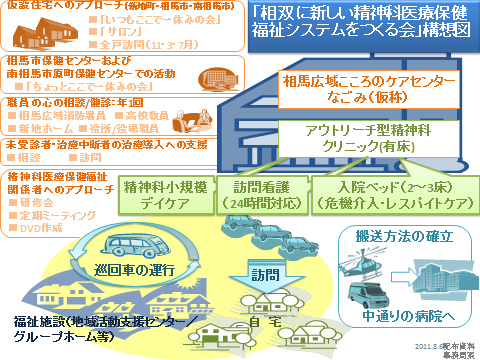 This Obon marks five months since the 3/11 Great East Japan Earthquake and Tsunami. As of 8/11, 20,433 people are reported dead or missing and more than 90,000 people are still displaced from home. In this time of sorrow and remembrance, Japan Society has given us at JMSA hope and the opportunity of a lifetime to profoundly impact one of the medically underserved areas of East Japan by awarding us a three-year grant to support Kokoro no Care programs in Fukushima.
This Obon marks five months since the 3/11 Great East Japan Earthquake and Tsunami. As of 8/11, 20,433 people are reported dead or missing and more than 90,000 people are still displaced from home. In this time of sorrow and remembrance, Japan Society has given us at JMSA hope and the opportunity of a lifetime to profoundly impact one of the medically underserved areas of East Japan by awarding us a three-year grant to support Kokoro no Care programs in Fukushima.
People in Fukushima prefecture suffer from high levels of stress as they face the aftermath of the earthquake and tsunami, and the fear of harmful radiation. For survivors dealing with these issues and grieving for lost loved ones, quality mental health care is a great need.
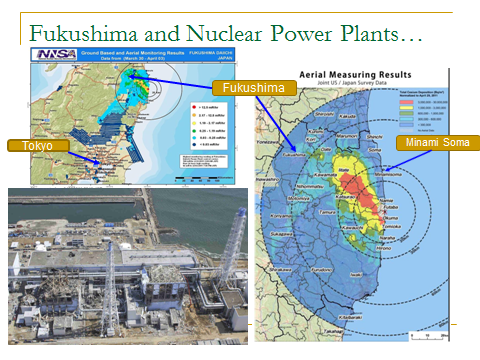
Unfortunately, mental health care resources are currently scarce in Fukushima. Even prior to 3/11, many areas such as Soma City (population 38,000) did not have mental health clinics or hospitals with a psychiatry unit, so patients commuted to Minami Soma for their care.? However, since 3/11, their care has been interrupted because a large part of Minami Soma falls within the 30 km evacuation zone from the Daiichi Nuclear Power Plant; almost all mental health care facilities in Minami Soma, including four hospitals with psychiatry units and several outpatient clinics, have been closed down since 3/11. This amounts to 840 psychiatric inpatient beds.
Faced with dire need and a lack of mental health care resources for Soma and Minami Soma, Dr. Shinichi Niwa and his “Kokoro no Care” team at Fukushima Medical University began executing their plan to build a new mental health care system in the area.? Their main goals are to:
- Provide ongoing therapy and support for patients with preexisting mental health conditions
- Provide early intervention for disaster related depression and Post-Traumatic Stress Syndrome (PTSD)
- Reduce cognitive functional decline in displaced elderly residents
- Prevent expected rises in the suicide rate and “lonely deaths”
- Decrease hospital admissions for mental health
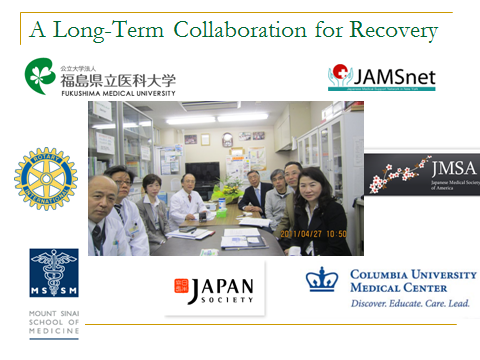
After thorough research and visits to several local medical facilities, JMSA identified Kokoro no Care as a meaningful, long-term project that will significantly impact areas affected by the earthquake, tsunami, and radiation. With the help of Mr. Eisaku Sato and the Rotary Club, JMSA has established a relief fund and has sent $150,000 to help start the program.? We at JMSA believe that our collaboration with the Kokoro no Care team and core networking groups including Columbia University, Fukushima Medical University, JAMSnet Tokyo, JAMSnet NY, Japan Society, Mount Sinai Global Health, Noveida, and Rotary Club represents a truly unique international effort to support the financial and operational aspects of local relief efforts in Fukushima.
As the intial step in the Kokoro no Care project, Dr. Niwa and his team opened a temporary mental health clinic at Soma Public General Hospital (公立相馬総合病院) with the support of many volunteer mental health specialists and other medical staff. Since 3/29, they have had 500 outpatient visits and some 20 patients who required admission to a psychiatric hospital in central Fukushima.
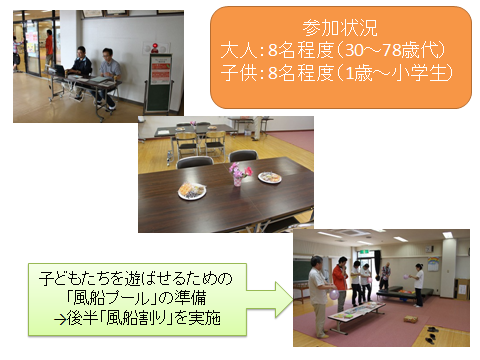
The team also began to offer stress relief sessions to the general public through a program called “Let’s take a break” (ちょっとここで一休みの会) which is held weekly at various town halls near the temporary housing units. At the sessions, a team consisting of mental health nurses, occupational therapists, clinical psychologists, and social workers conducts various relaxation exercises, yoga, kids’ play, and counseling. The average attendance has been about 15 people per meeting including children and adults.
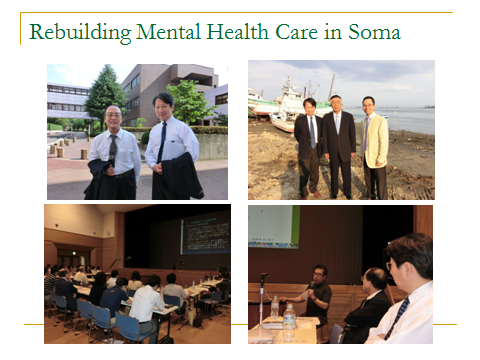 In the next phase, Dr. Niwa and his Kokoro no Care team are planning to establish two multidisciplinary satellite mental health care outreach teams as well as a day care center in order to better serve the needs of Soma and Minami Soma. The day care center will serve as the base office for outreach teams, and will also house 2-3 short stay beds for acute or respite care services. These facilities will offer much needed breaks for families caring for elderly or chronically ill family members at home.
In the next phase, Dr. Niwa and his Kokoro no Care team are planning to establish two multidisciplinary satellite mental health care outreach teams as well as a day care center in order to better serve the needs of Soma and Minami Soma. The day care center will serve as the base office for outreach teams, and will also house 2-3 short stay beds for acute or respite care services. These facilities will offer much needed breaks for families caring for elderly or chronically ill family members at home.
Japan Society will generously fund JMSA over the next three years to help support? the Kokoro no Care project in Fukushima. This will provide much needed financial support to implement this important project as a model for future mental healthcare systems in Japan.
